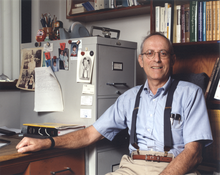Irwin Fridovich
Irwin Fridovich (born August 2, 1929 in New York City - † November 2, 2019 ) was an American biochemist . He was best known for discovering the biological importance of oxygen radicals and for studying the mechanisms by which organisms protect themselves against the toxic effects of these radicals.
Life
Fridovich graduated from City College of New York with degrees in biology and chemistry in 1951 . After working as a research assistant at Cornell Medical School in Ithaca , New York , Fridovich received his Ph.D. in biochemistry in 1955 with Philip Handler at Duke University School of Medicine in Durham , North Carolina . As a post-doctoral student he was at the National Institutes of Health in 1955/56 . He then became a lecturer (instructor) at Duke University, 1961 assistant professor , 1965 associate professor and 1971 full professor.
Since 1987 he has been a member of the scientific advisory board of Sandoz AG .
Fridovich had been married since 1952 and had two children.
Act
In his doctoral thesis (1955) Fridovich identified hypoxanthine as a possible cofactor in the oxidation of sulfite . During his further scientific career, Fridovich studied the biology of oxidation. For example, he examined the ability of xanthine oxidase to catalyze the oxidation of sulfite and showed that a chain of free radicals , cytochrome c and O 2 - are involved. As a result, Fridovich and co-workers isolated various superoxide dismutases (SOD) and showed that they either contain copper / zinc and are located in the cytoplasm or contain manganese and are found in mitochondria . The high agreement between the different SOD supports the endosymbiotic theory .
Later work by Fridovich dealt with the effect of paraquat on metabolism. Escherichia coli, for example, adapts to oxidative stress through increased production of manganese SOD and is therefore less sensitive to certain quinone antibiotics. More recent work by Fridovich dealt with the search for stable, non-toxic analogues of the superoxide dismutases.
Awards (selection)
- 1979 member of the American Academy of Arts and Sciences
- 1980 Herty Medal from the American Chemical Society
- 1980 Honorary Doctorate from the University of Paris V (Rene Descartes)
- 1981 member of the National Academy of Sciences
- 1984 Cressy A. Morrison Award from the New York Academy of Sciences
- 1987 Passano Award
- 1990 Townsend Harris Medal
- 1997 Elliott Cresson Medal from the Franklin Institute
From 1982 to 1983, Fridovich was President of the American Society of Biological Chemists .
Fonts (selection)
- Irwin Fridovich: The trail to superoxide dismutase. In: Protein science. Volume 7, Number 12, December 1998, pp. 2688-2690, ISSN 0961-8368 . doi: 10.1002 / pro.5560071225 . PMID 9865966 . PMC 2143889 (free full text).
- Irwin Fridovich: Reflections of a Fortunate Biochemist. In: The Journal of Biological Chemistry. 2001, 276, 28629-28636, doi: 10.1074 / jbc.R100040200 .
literature
- Nicole Kresge, Robert D. Simoni, Robert L. Hill: Forty Years of Superoxide Dismutase Research: the Work of Irwin Fridovich. The Journal of Biological Chemistry , 281, e17. Online June 2, 2006
Individual evidence
- ↑ Date of birth according to Pamela Kalte u. a. American Men and Women of Science , Thomson Gale 2004.
- ↑ Duke Flags Lowered: Biochemist Irwin Fridovich This at Age 90
- ↑ Book of Members 1780 – present (PDF, 222 kB) of the American Academy of Arts and Sciences (amacad.org); Retrieved July 1, 2012.
- ^ Past Recipients - The Passano Foundation, Inc. In: passanofoundation.org. Accessed April 19, 2019 .
| personal data | |
|---|---|
| SURNAME | Fridovich, Irwin |
| BRIEF DESCRIPTION | American biochemist |
| DATE OF BIRTH | August 2, 1929 |
| PLACE OF BIRTH | New York City |
| DATE OF DEATH | 2nd November 2019 |
